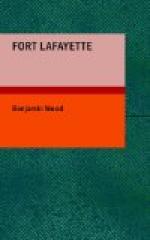CHAPTER XXIV.
No need to say that Harold was well cared for by his two friendly foes. Beverly had given his personal parole for his safe keeping, and he was therefore free from all surveillance or annoyance on that score. His wounds were not serious, although the contusion on the temple, which, however, had left the skull uninjured, occasioned some uneasiness at first. But the third day he was able to leave his bed, and with his arm in a sling, sat comfortably in an easy-chair, and conversed freely with his two excellent nurses.
“Did Beverly tell you of Arthur’s imprisonment?” he asked of Oriana, breaking a pause in the general conversation.
“Yes,” she answered, looking down, with a scarcely perceptible blush upon her cheek. “Poor Arthur! Yours is a cruel government, Harold, that would make traitors of such men. His noble heart would not harbor a dangerous thought, much less a traitorous design.”
“I think with you,” said Harold. “There is some strange mistake, which we must fathom. I received his letter only the day preceding the battle. Had there been no immediate prospect of an engagement, I would have asked a furlough, and have answered it in person. I have small reason to regret my own imprisonment,” he added, “my jailers are so kind; yet I do regret it for his sake.”
“You know that we are powerless to help him,” said Beverly, “or even to shorten your captivity, since your government will not exchange with us. However, you must write, both to Arthur and to Mr. Lincoln, and I will use my best interest with the general to have your letters sent on with a flag.”
“I know that you will do all in your power, and I trust that my representations may avail with the government, for I judge from Arthur’s letter that he is not well, although he makes no complaint. He is but delicate at the best, and what with the effects of his late injuries, I fear that the restraint of a prison may go ill with him.”
“How unnatural is this strife that makes us sorrow for our foes no less than for our friends?” said Oriana. “I seem to be living in a strange clime, and in an age that has passed away. And how long can friendship endure this fiery ordeal? How many scenes of carnage like this last terrible one can afflict the land, without wiping away all trace of brotherhood, and leaving in the void the seed of deadly hate?”
“If this repulse,” said Beverly, “which your arms have suffered so early in the contest, will awaken the North to a sense of the utter futility of their design of subjugation, the blood that flowed at Manassas will not have been shed in vain.”
“No, not in vain,” replied Harold, “but its fruits will be other than you anticipate. The North will be awakened, but only to gird up its loins and put forth its giant strength. The shame of that one defeat will be worth to us hereafter a hundred victories. The North has been smitten in its sleep; it will arouse from its lethargy like a lion awakening under the smart of the hunter’s spear. Beverly, base no vain hopes upon the triumph of the hour; it seals your doom, for it serves but to throw into the scale against you the aroused energies that till now have been withheld.”




